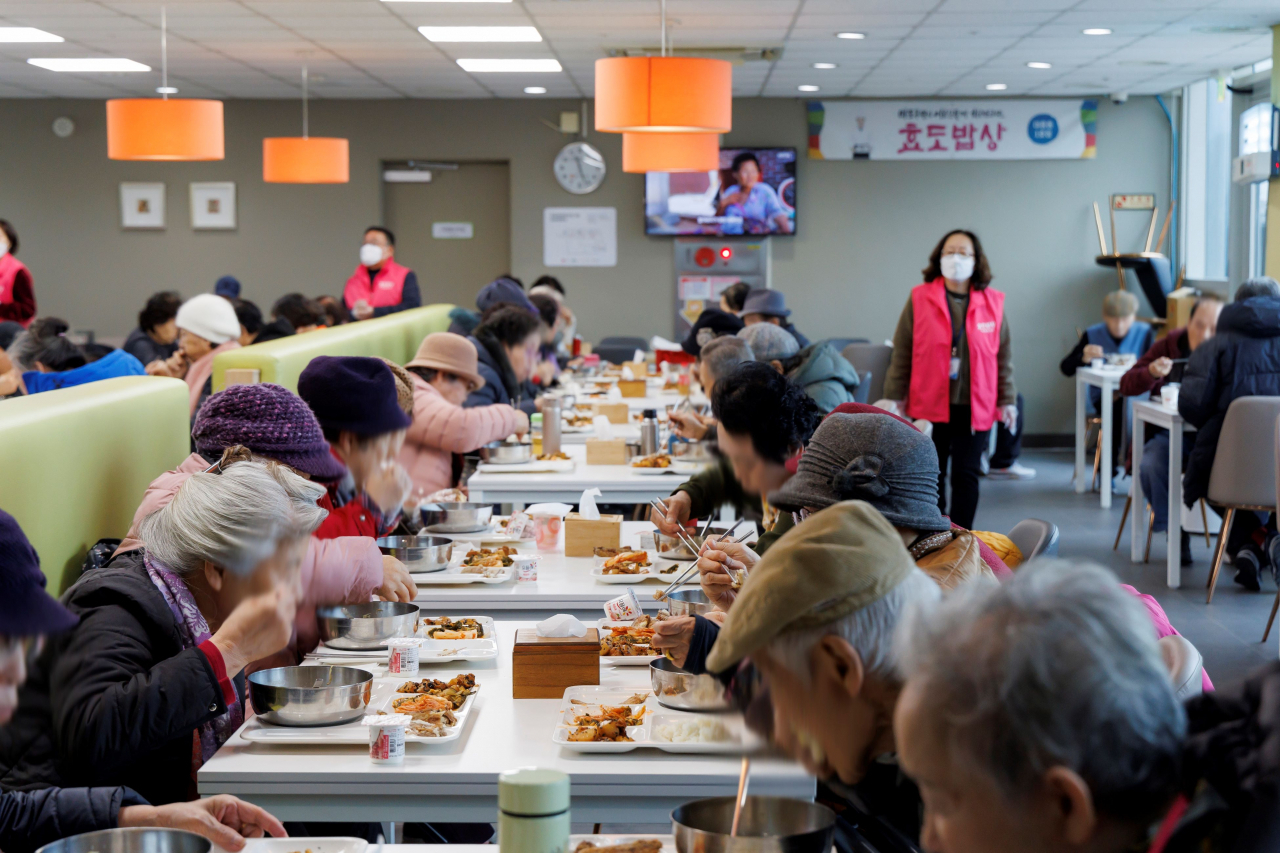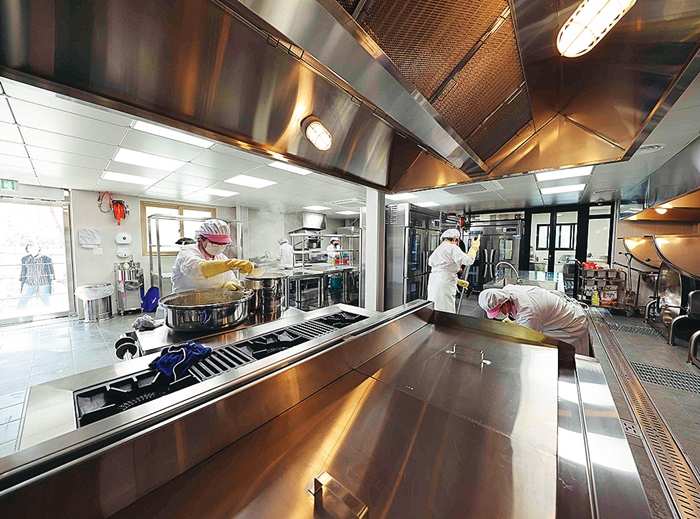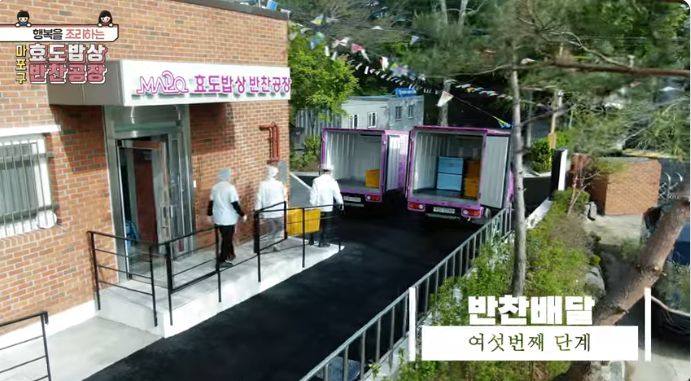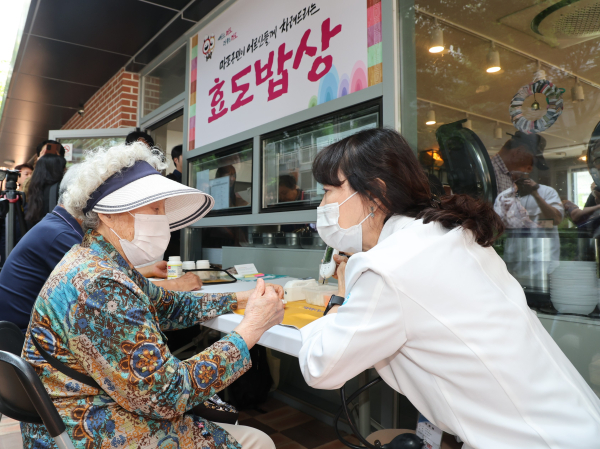[Case 28] The “Hyodo Bapsang” Program with Community Care
The “Hyodo Bapsang” Program with Community Care
A well-balanced diet is fundamental to healthy ageing, as it helps prevent and slow the progression of chronic diseases while extending both lifespan and healthspan. However, ageing often brings challenges that make meal preparation difficult, such as reduced mobility or restricted access to fresh, high-quality ingredients. Older adults living alone are particularly vulnerable to nutritional imbalances, frequently skipping meals or relying on plain foods like bread or rice cakes that are convenient but lacking essential nutrients.
To support the nutritional well-being of low-income older adults, most local governments provide meal services through congregate dining at welfare centers and meal deliveries for seniors with limited mobility. However, many older adults who exceed the income criteria for these programs also face challenges in accessing quality meals. According to the Ministry of Health and Welfare’s 2023 Survey on the Living Conditions of Older Persons, while lower-income individuals were more likely to have poor nutritional status, 30.7% of those with an income at or above 150% of the median still required attention or improvement in their nutrition.
Amid rapid population ageing and the rise of single-person households, the demand for high-quality meals is growing among older adults who struggle with meal preparation. However, with limited financial resources, dining out or ordering in is not a sustainable solution. This unmet need is evident in the long queues of older adults at free meal programs run by religious organizations and welfare centers offering affordable, nutritious meals. In response, there is growing advocacy for government and local-level meal assistance programs to safeguard the right to health for older adults who struggle to prepare their own meals.
The Mapo Hyodo Bapsang Program with Community Care is a Mapo District1) initiative that provides meal support for adults aged 75 and older across all income levels. Hyodo Bapsang literally means “a table of filial piety.” The term reflects the program’s aim to honor and care for seniors through warm, communal meals supported by local residents; it serves as a notable example of public efforts to address nutritional gaps among older individuals. Since its launch in 2023, the program has been providing well-balanced meals six days a week to seniors in need of meal assistance. Beyond nutrition and social connection, the program seeks to function as a comprehensive support system, offering free health check-ups, and coordinating easier access to professional services like legal and tax counseling. Its primary beneficiaries are older adults living alone, followed by those without family support. Visitors check in by tagging cards issued by the community service center, a system designed to ensure the well-being of participants. If someone is absent, staff members follow up with phone calls or in-person visits to check on them.
The Mapo Hyodo Bapsang Program with Community Care was launched as a key campaign pledge of Mapo District Mayor Park Kang-soo during the 8th publicly elected administration. Following the establishment of a basic plan in September 2022, the initiative progressed through the formation of a task force (Sep. 2022), the enactment of the “Mapo District Ordinance on Senior Meal Assistance” (Dec. 2022), and the development of an implementation plan (Jan. 2023) before officially launching on April 24, 2023, with its first location in Seogang-dong, alongside six other meal service sites. Unlike fully government-funded programs, this initiative operates with significant financial support from donations rather than relying solely on the district budget. Volunteers have also played a crucial role in its success. To sustain the program, Mayor Park and the district government launched the "One-Person, One-Sponsorship Campaign" in November 2022, which had raised approximately KRW 1.8 billion (USD 1.2 million) in donations as of December 2024. The majority of ingredient costs are covered by these contributions. According to a district council report, the projected budget for the program in 2025 is KRW 3.2 billion (USD 2.2 million), with KRW 1.2 billion (USD 825K) allocated from Mapo District’s budget (including contributions and project expenses), while the remaining costs will be covered by KRW 1.7 billion (USD 1.1 million) in donations and KRW 300 million (USD 206K) from the Mapo Welfare Foundation.

Image 1: Volunteers in pink vests assist and oversee senior diners at the first dining site of the Mapo Hyodo Bapsang Program with Community Care in Daeheung-dong. (Source: Mapo District)
As of February 2025, the number of dining sites participating in the program has grown to 52, collectively serving around 1,800 visitors daily. This significant expansion was made possible by the launch of "Side Dish Factory," a centralized meal production and distribution facility developed as part of the program. Initially, participating restaurants and welfare centers were individually responsible for both meal preparation and service, receiving only partial financial support from the program. However, as they struggled with operational deficits, recruiting new participants became increasingly difficult. At the same time, establishing a district-run catering facility was not a viable option due to time and budget constraints. To tackle this challenge, the District developed a centralized meal production and distribution system and allocated KRW 800 million (USD 550K) to renovate and repurpose a company housing unit at a rainwater pumping station into a meal production facility. The initiative received additional support from Hanssem, a Mapo-based furniture manufacturer, which donated kitchen equipment and furniture. With the launch of Side Dish Factory in April 2024, the program significantly expanded its capacity, producing 1,000 servings per day and delivering freshly prepared meals to participating dining sites. At the Side Dish Factory, a total of 16 staff members work on-site, including seven full-time employees—a nutritionist, cooks, kitchen assistants, and a driver. Additionally, nine workers are employed through a self-sufficiency program and an employment initiative for seniors and individuals with disabilities.

Image 2: Inside Side Dish Factory (Source: Mapo District)

Image 3: Meals prepared at Side Dish Factory being loaded onto trucks for distribution to dining sites. (Source: Mapo District Official YouTube Channel)
As previously mentioned, the meal program goes beyond nutritional support, offering a comprehensive care service that monitors the well-being of senior participants. This effort is driven by approximately 300 resident volunteers, recruited through the Mapo Volunteer Center, who provide companionship and assistance to senior diners and check on them through phone calls or in-person visits. Additionally, nurses from local community service centers visit the dining sites to provide free basic health check-ups and counseling on chronic conditions such as diabetes and hypertension. Beyond medical care, the program also facilitates access to legal and tax counseling, services that are often difficult for older adults to obtain, ensuring they receive the guidance they need.

Image 4: A visiting nurse checking a senior diner's blood sugar level before the meal. (Source: Mapo District)
An associate of the Mapo District office, in an interview with Chosun Biz, a Korean news outlet, highlighted the physical and emotional benefits of the program, stating, "Traveling to and from the dining site serves as a great form of exercise for older adults. Even the simple act of getting ready to go out gives them a boost of energy." Emphasizing the program’s mental health benefits, he added, "Sharing a meal with others helps alleviate feelings of depression and, in the long run, can help prevent solitary deaths."
As its name suggests, the Mapo Hyodo Bapsang Program with Community Care thrives on active community support, with volunteers assisting at dining sites and financial contributions from individuals and organizations helping cover operational costs. Since its launch, the program has received approximately KRW 1.8 billion (USD 1.2 million) in donations over the past 1.5 years as of December 2024. Notably, one local senior pledged to bequeath his entire estate to the program, an act that drew significant attention within the community.
The district has set an ambitious expansion goal—establishing a second Side Dish Factory by 2025, which would scale up the program’s production capacity to 2,000 servings per site. With two production facilities in operation, the initiative will be able to serve up to 4,000 visitors daily.
* * *
The Mapo Hyodo Bapsang Program with Community Care is emerging as an innovative model for public meal assistance in an ageing society, integrating meal provision with essential care services such as health check-ups and well-being monitoring. By addressing both physical and mental health needs, the program enhances the overall quality of life for local seniors. What truly sets the program apart is its inclusive approach—providing equal benefits to all seniors who meet the single eligibility criterion of age, ensuring that no one is left behind. Moreover, it fosters social solidarity by encouraging voluntary participation from community members in both financial and operational support. While the initiative currently focuses on older individuals living alone, there are many seniors who, despite living with children or spouses, still struggle with meal preparation. The district’s expansion plan could bridge this gap by extending services to those who do not currently qualify due to their living arrangements.
With its successful grassroots-driven approach to funding and manpower mobilization from the very start, the Mapo Hyodo Bapsang Program with Community Care is expected to offer valuable insights for local governments seeking to develop their own nutrition support initiatives for older residents.
-----------------------------------------------------------------------------
1) Mapo District is a local administrative unit located in the central-western part of Seoul. It covers an area of 23.84㎢, accounting for 3.93% of Seoul’s total land area. As of December 2024, Mapo’s registered population stands at 372,745, representing 3.9% of Seoul’s total population, making it the 15th most populous district out of 25. Among its residents, 60,009 individuals (3.3% of Seoul’s senior population) are aged 65 and older, ranking 19th among the city’s 25 districts. The district’s budget for 2024 is set at KRW 841.2 billion (USD 578 million).